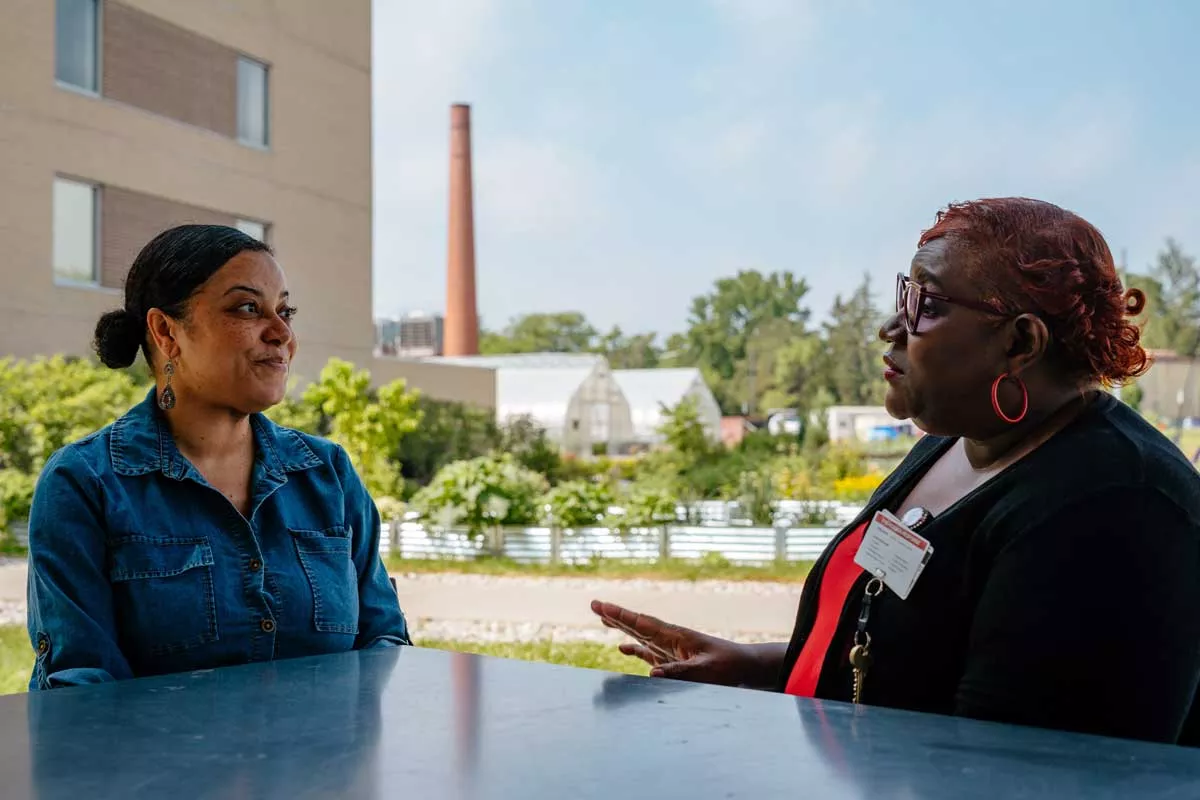Overview:
- Community health workers (CHWs) are vital connectors in Michigan's health system, bridging gaps between residents and essential services.
- They empower individuals to manage chronic illnesses, secure food and housing, and navigate complex healthcare systems.
- Particularly crucial for those facing poverty, disability, or housing insecurity, CHWs are not medical professionals but trusted guides who work in hospitals, clinics, and nonprofits.
- Research underscores their impact, showing improved health outcomes and cost reductions, highlighting their indispensable role in addressing social determinants of health.
Read our entire series on Community Health Workers here>>>
Community health workers are a vital but often overlooked part of Michigan’s health system, especially as recent federal Medicaid cuts threaten coverage and funding for essential services. They help people manage chronic illnesses, apply for health insurance, find food or housing, and understand what their doctor told them. If you’ve never heard of a CHW or aren’t sure if one could help you, this guide breaks it down.
What is a community health worker?
A CHW is a trained public health professional who connects people with health care, social services, and everyday support. CHWs usually live or work in the same communities as the people they help, and they build trusting relationships through shared experience.
CHWs are not doctors or nurses. Instead, they help people manage health conditions and navigate systems that are often hard to access. Their work is especially important for people dealing with poverty, disability, housing insecurity, or chronic illness.
What do CHWs do in Michigan?
According to a 2024 statewide survey by the Michigan Community Health Worker Alliance (MiCHWA):
- 72% of CHWs help people meet basic needs like food, housing, and utilities.
- 66% follow up on referrals to make sure services are received.
- 63% help with transportation to medical appointments.
- Over half help with Medicaid or other insurance enrollment.
CHWs also help people manage conditions like diabetes, connect with mental health care, and apply for disability or social services. They may work in hospitals, clinics, health departments, or nonprofits.
Are CHWs certified or trained?
Yes. Most CHWs in Michigan complete a core competency training program approved by MiCHWA. This 126-hour course includes communication skills, cultural responsiveness, health education, and care coordination.
Certified CHWs are listed in a statewide registry, which is also used to verify eligibility for Medicaid reimbursement. While certification is not legally required to do CHW work, it is recommended for most jobs in Michigan.
What are the policy goals to advance CHWs in Michigan?
Statewide advocacy groups like MiCHWA are pushing for higher Medicaid reimbursement rates, expanded billable services, and more stable funding for CHW positions beyond temporary grants. These efforts have become more urgent in light of the recent federal Medicaid cuts, which are projected to reduce Michigan’s federal health care funding by billions over the next decade.
How effective are community health workers?
Research shows that CHWs can improve health outcomes and reduce costs. A 2023 review in the Annual Review of Public Health found that CHW programs led to fewer emergency room visits, better chronic disease management, and lower hospital readmission rates. Some studies show a return of more than $2 for every dollar invested in CHW services. CHWs are especially effective when they share lived experiences with the people they serve and are integrated into care teams.
Can CHWs be paid through insurance?
Sometimes. Private insurance and Medicare coverage for CHWs is less common, although some health systems and pilot programs have begun including CHWs in care teams.
As of January 2024, Michigan Medicaid began reimbursing certified CHWs for services like health coaching and social support. But this system is still new, and not all providers are set up to bill for CHW services yet. Medicaid only covers certain tasks, so much of a CHW’s work may still go unpaid.
This new system faces fresh uncertainty following federal Medicaid cuts. These changes may affect state Medicaid funding and could limit future expansion of reimbursable CHW services.
How can I work with or become a CHW?
If you’re a patient: Ask your primary care provider or local clinic if they work with a CHW. Some hospitals, like Trinity Health and Henry Ford Health, employ CHWs who help with food, housing, transportation, and insurance.
If you’re interested in becoming a CHW: MiCHWA offers listings for CHW training programs and certification pathways. Most CHW jobs require a high school diploma or equivalent, lived experience with health or social systems, and strong communication skills.
You can also check local health departments, community clinics, and nonprofit organizations for CHW job openings.
Resources
- Michigan Community Health Worker Alliance (MiCHWA): michwa.org
- Michigan 2-1-1 (for housing, food, and health resources): Call 2-1-1 or visit mi211.org
- MDHHS Medicaid CHW reimbursement policy: Search “MMP 23-74” at michigan.gov/mdhhs
- CHW training and certification programs: michwa.org/training
This reporting series from Planet Detroit examines the growing role of community health workers (CHWs) in Michigan—trusted professionals who assist residents in navigating housing, food access, managing chronic illnesses, and the healthcare system. Medicaid cuts could undermine funding for these workers, who often come from the same communities they serve. By building trust and drawing on lived experience, CHWs are addressing critical gaps in care that traditional health systems often overlook. This project was made possible with support from the Michigan Health Endowment Fund.



